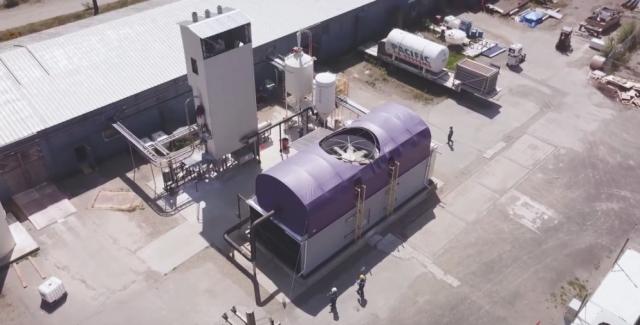
Carbon Engineering’s working pilot plant in Squamish, British Columbia, where it has been removing CO₂ from the atmosphere since 2015 and converting it into fuels since December 2017. (Source: Carbon Engineering)
Oil majors Chevron Corp. (NYSE: CVX) and Occidental Petroleum Corp. (NYSE: OXY) are taking a minority stake in a Canadian start-up that has developed technologies to suck CO₂ directly from the atmosphere and use it to make synthetic fuel.
The deal marks the first significant investment by energy groups into the technology, known as direct air capture, which pulls CO₂ from the atmosphere by using chemicals and fans.
Carbon Engineering, a Bill Gates-backed start-up based in Squamish, British Columbia, said the new investment was part of a $60 million fundraising round that would help it design and build commercial-scale plants. The company has not disclosed its valuation.
The investment comes at a time when the oil and gas industry is racing to find ways to reduce carbon emissions while also maintaining its core business model, producing and selling fuel. Part of the answer could be “negative emissions,” which refers to a range of technologies that reduce the level of CO₂ in the air.
“Negative emissions are increasingly essential in the various scenarios for how we address climate change,” said Steve Oldham, CEO of Carbon Engineering. “It’s infeasible that we all stop using fossil fuels overnight.”
Unlike more traditional methods of carbon capture, which rely on pulling CO₂ out of a smokestack or from close to the source of emissions in an industrial process, direct air capture sucks CO₂ from the air.
The process has long been thought to be too expensive to be deployed on a large scale, but a paper published last year in scientific journal Joule using data from Carbon Engineering’s pilot plant suggested it could cost as little as $100 a tonne of CO₂ extracted.
Carbon Engineering also uses CO₂ to produce synthetic fuels that can substitute for gasoline, jet fuel or marine fuel and be used in the same engines without modification, according to the company.
Even though these fuels produce CO₂ when burnt, they are considered low-carbon fuels because they are made using CO₂ that came from the atmosphere in the first place.
The investment in Carbon Engineering is only the second public deal made by Chevron’s Future Energy Fund, following its investment last year in ChargePoint, an electric vehicle charging company.
“We are interested in looking at innovations around carbon capture,” said Barbara Burger, head of Chevron Technology Ventures. The fact that Carbon Engineering uses CO₂ to make synthetic fuels is an area of particular importance, she added, pointing to Chevron’s significant downstream business.
Occidental said it was particularly interested in exploring atmospheric carbon extraction to complement its EOR operations, which inject CO₂ into old wells to maximize their production.
Recommended Reading
STRYDE Provides Seismic Survey Solutions Globally
2024-07-25 - Companies across various sectors look to use STRYDE’s conventional and in-field processing services for 2D and 3D seismic surveys.
Honeywell Bags Air Products’ LNG Process, Equipment Business for $1.8B
2024-07-10 - Honeywell is growing its energy transition services offerings with the acquisition of Air Products’ LNG process technology and equipment business for $1.81 billion.
AI & Generative AI Now Standard in Oil & Gas Solutions
2024-07-25 - From predictive maintenance to production optimization, AI is ushering in a new era for oil and gas.
TGS Releases Illinois Basin Carbon Storage Assessment
2024-09-03 - TGS’ assessment is intended to help energy companies and environmental stakeholders make informed, data-driven decisions for carbon storage projects.
STRYDE Awarded Seismic Supply Contracts in Mexico
2024-09-03 - STRYDE was awarded two seismic node supply contracts in Mexico, the company’s first projects in the country.
Comments
Add new comment
This conversation is moderated according to Hart Energy community rules. Please read the rules before joining the discussion. If you’re experiencing any technical problems, please contact our customer care team.





